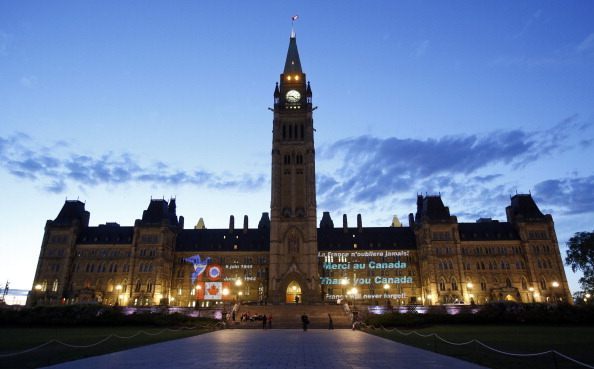On Sunday, Canadian Prime Minister Stephen Harper announced the country would be returning to the polls, asking Governor General David Johnston to dissolve Parliament for a general election to be held Monday, October 19th.
With busses running in their driveways, powered by anticipation and an open field, Justin Trudeau (Liberal), Thomas Mulcair (NDP), Elizabeth May (Green), and Gilles Duceppe (Bloc Quebecois) quickly joined Harper in beginning their campaigns to lead the country.
For 78 days, everything else in Canada will be pushed to the back pages, as the five leaders vie for control of Parliament, and a country with a falling dollar, lagging international relevance, and deteriorating social infrastructure.
This will be the longest federal election in Canada since the first two. The Canadian Press claims that the 1867 campaign was 81 days, and the 1872 campaign 96 days. Of course, late 19th century politics were plagued by a lack of technology that facilitates contemporary elections and their lengths were born of necessity.
The 2015 iteration will simply test the patience and attention span of Canadians, while possibly doubling the amount each campaign spends. Whether or not Canadians are prepared or willing to endure American-style campaigns that seemingly exist it perpetuity remains to be seen, especially as the latter stages will overlap with the beginning of the NHL season.
At its outset, this campaign appears to be about its candidates as opposed to its ideas or ideals. The incumbent is running on a suspect record, though positioning himself as the veteran of experience in contrast to his two main opponents, Trudeau and Mulcair.
Already, on social media, the Conservatives are referring to the Liberal leader as “Justin” and the NDP’s Mulcair by his surname, attempting to highlight Trudeau’s youth as a detriment and separate him from his familial legacy. Expecting Canadians to forget Trudeau is young and related to Canada’s arguably most revered Prime Minister seems an exercise in folly, but the Conservatives have an air of desperation around them born of scandal and a lagging economy.
Perhaps emboldened by the NDP’s surprise win in the Alberta provincial election, Thomas Mulcair appears poised to lead the party’s most legitimate threat to govern since the Ed Broadbent era.
No longer willing to play the content third party spoiler, the New Democrats are positioning themselves as the frontrunners. The NDP and the Conservatives are currently embroiled in a spat about which debates to show up for, a conversation that leaves out the Liberals and promotes the two arguing parties as leaders in the polls. Whether or not Canadians are willing elect the NDP federally remains to be seen, though there is no federal Wildrose Party to split the centre to left vote as their was in Alberta.
If the federal election does have its own Wildrose, it’s Duceppe and the Bloc Quebecois. The elder statesman of this campaign made a somewhat quiet return to politics in order to add Quebec sovereignty to the national discourse.
Duceppe’s experience and social liberalism could position the BQ to make a return to prominence in federal politics after losing 43 seats and national relevance in the 2011 election. May promotes herself as a spoiler, but the fifth party candidate is here for ideas and an extra voice, not as a legitimate contender.
This election will have a slightly different electoral map, as a result of a 2012 redistribution, which saw districts increased to 338, adding seats based on population assigned to Alberta (6), British Columbia (6), Ontario (15), and Quebec (3). The redistribution will find the leaders battling it out in Ontario (minus Duceppe), which isn’t abnormal for a federal election, but promises for intriguing storylines on election night as new ridings will have no history on which to base predictions.
So, as summer promises an end and Back-to-School sales begin to pepper our periphery, Canada prepares for an electoral endurance not seen since confederation.
Fittingly, the winner of the 2015 election will lead the country during the 2017 celebration of Canada’s 150th birthday. Who that leader is will have much to do with whether they can separate themselves from perception; Harper as a poor leader, Trudeau as an inexperienced legacy, and Mulcair as too socialist for a federal electorate. This fall should be the most compelling in sometime.

COMMENTS
Please let us know if you're having issues with commenting.